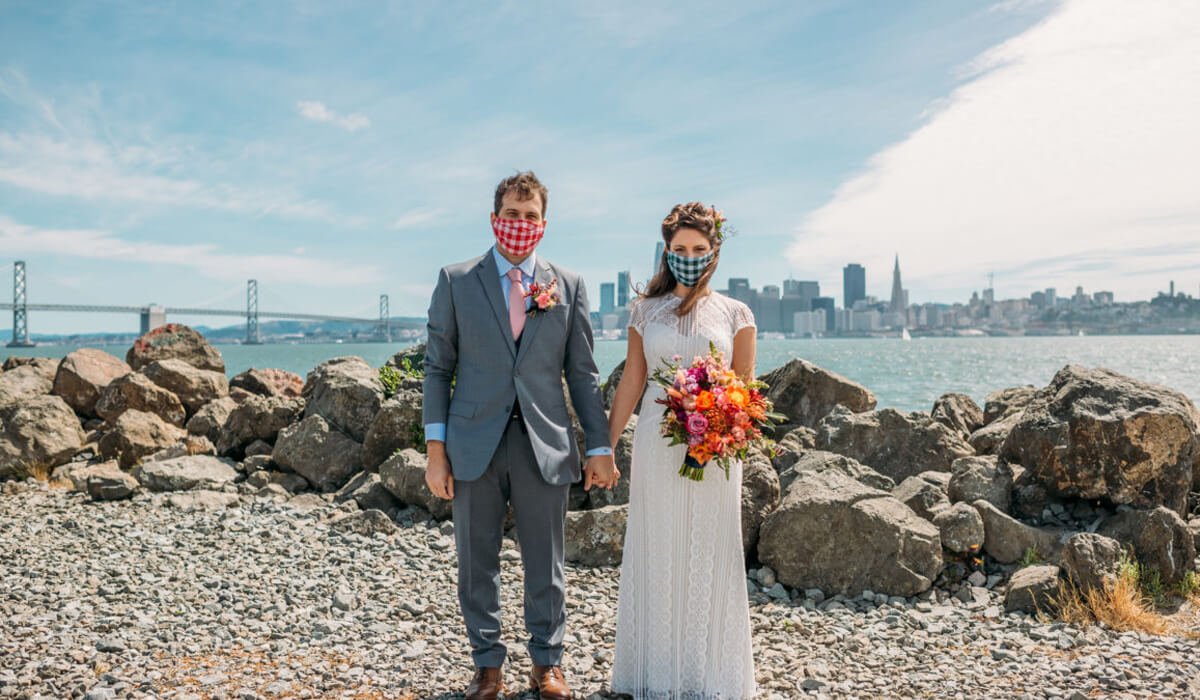Experts discuss today’s challenges and what to expect in the future.
Right now, whether you’re planning a wedding at home or abroad, there are countless moving parts surrounding COVID-19—and what it means for your event, specifically, really depends on your wedding date, guest count, location, and extent of travel involved.
At this point, it’s safe to say that any wedding in the near future will look differently, whether it’s allowed to happen on a smaller scale now or as you’d dreamed later on. To help you prepare for what you should do—and help if you do, sadly, have to change plans—we spoke with experts across the industry to give you a closer look at how COVID-19 is affecting wedding planning today, and how to prep for the coming months.
Their overall advice? Be prepared, follow the news closely, and maintain an open conversation with your vendors and guests. Also, if you can, book a planner—even an hourly one if your budget allows—to help navigate everything. And, most importantly: Keep your eye on the end goal!
“As always, take care of yourself. Honestly, it’s OK to cry. It’s OK to be angry or to feel a wide range of emotions,” says Alison Laesser-Keck of Alison Bryan Destinations. “One thing we like to tell our clients is that it’s not a matter of if, just a matter of when. Your day will come, and trust us when we say it will be the most amazing thing. When we can all come together and celebrate, there will be nothing else like it.”
Below, what you need to know about COVID-19 and wedding planning, based on when and where you’re saying “I do.”
Table of Contents
How Industry Leaders Feel After a Year of COVID-19
“We’ve definitely noticed a trend where people are excited about getting married again, yet they question whether or not they should be booking anything new,” says Laesser-Keck. “It’s this weird in-between time where things still feel relatively uncertain and yet we all know the end of this pandemic is near. Unfortunately, whereas last year we thought those willing to take the risk were crazy, now we feel like if you’re not willing to lock something in soon, you’re probably not going to have the ‘dream team’ for your wedding in 2022 and will likely have to make some sacrifices (or wait until 2023).”
Miami-based Annie Lee, the principal planner at Daughter of Design and founder of Plannie, believes that the “end is in sight.” “It’s really the first time in a year that I feel this way, and I just urge everyone to hold fast a little while longer and not loosen the reins prematurely,” she says. “Although we see a coming break in the clouds, there are still some showers today. Everyone’s hope level is off the charts now with vaccine supplies and distributions rolling out at a faster pace. That said, there are things to consider.”
The Challenges of Planning a Wedding Mid-Pandemic
According to Lee, the main things to consider: one, the health risks and guest safety, and, second, government COVID-19 guidelines. “Unfortunately, we’ve seen that these two do not always align—sometimes laws being too lax when risks are high and sometimes being too strict when risks are low,” she says. “There has been an unpredictability and capriciousness to when local government officials update COVID-19 rules so couples continue to plan for both hopeful and cautious scenarios until this is truly all behind us.”
Laesser-Keck believes navigating all this uncertainty has been the year’s biggest obstacle. “In 2021, the challenge is the unknown, particularly not knowing how many guests will be allowed at events this summer,” she says. “Every city, county, and state has different regulations, so anticipating that, while also making it seamless for guests, can be tough. Even if July ends up being okay, for example, the problem stems from the fact that you have to know what you’re dealing with right now—and we don’t know what we’re dealing with yet.”
To help couples without a full-time planner understand the rules and regulations in their area, Lee launched the Gathering Guide on Plannie, her service which allows couples to hire local planners on a day or hourly rate. “We plan events in various locations around the world and it’s interesting to see how each local government has a different rule and the specific challenges that arise out of that,” she says. “That’s why, through our Plannie global planner network, we tried to keep track of each area’s local COVID-19 laws.” For example, in Florida where Lee is based, she says that “all restrictions are removed on the state level, which leaves individual venues to create their own rules so that there is no uniformity or consistency. One venue may be requiring masks, 50 percent capacity with no cocktail hour and dancing while the neighboring venue is at 100 percent capacity and maskless.” In California, events are still shut down with no indication of when that might change, while in New York, gatherings of up to 150 guests are allowed with testing, as of March 15, 2021. Lee adds, “Of course, all my year-end clients are wondering, “Do you think they’ll update it once more people have been vaccinated through summer?” And my answer is, “No idea! But hope so!”

How Testing and Vaccines Will Affect Planning
While we’re seeing a greater emphasis on testing at weddings, planners and couples are aware that it’s not a flawless system. “The testing is a good partial defense but I always caution against those who feel like it is full-proof and gives them a false sense of security,” Lee explains. “It’s helpful to determine who has had the virus for more than four days but not those who are not testing positive yet are still contagious.”
Vaccine roll-out should add another layer of protection, especially as more Americans are fully vaccinated. “All of our clients are mandating testing and/or vaccination certificates,” Laesser-Keck says. “They aren’t afraid of travel, but they’re taking all the necessary precautions to make this a safe experience for their guests. If there’s even a question as to whether or not it’s safe, they’re not doing it. They’d much rather postpone by six months or so and have the wedding they envisioned.”
“As long as effectiveness against new variants holds, vaccines are our get-out-of-jail cards,” Lee believes. “I really feel that is the key to unlock all these restrictions and allow us to gather safely again.”
What to Expect If You’re Planning a 2021 Wedding
“Whenever you can play it safe, do,” says Laesser-Keck, who, along with her husband and partner Bryan, specialize in destination weddings. “For us, it is important to make the decision at least four-to-five months before to allow guests to be able to modify their travel arrangements,” she continues. “It is also better for everyone’s mental health.”
At this point, she has postponed everything until August of 2021, saying, “We don’t expect things to look normal until the end of the summer, early fall (at best). There’s going to be a bit of a learning curve bringing people back together again. We are going to have to be flexible.”
Downsizing guest lists is something they’re prepared for. “We’ve advised our clients this summer to create three different guest lists, so we can easily jump on whatever direction is required at the time future mandates are announced. For fall and winter 2021, we’re feeling extremely positive as of now. For 2022, our approach is to lock things in as soon as possible before we’re in a position where there is nothing left.”
What to Expect If You’re Planning a 2022 Wedding
“For 2022, the primary challenge is venue and vendor availability,” Laesser-Keck states. “We’ve never seen so much interest in weddings and gatherings in the history of our company. While it may seem exciting, it’s actually really tough because we know that if we’re getting six inquiries a day, we can only imagine how many venues are getting. We’re already in a position of having to jump on decisions far sooner than we normally would, out of fear that our preferred venues and vendors won’t have availability.
For now, Laesser-Keck is working overtime to get her 2022 clients set up because, as she says, “it will be nearly impossible to secure the right talent once the world opens back up.” Her advice? “Book everything as soon as possible! Whether you’re doing this by yourself or with a planner, you’ll want to book many of your vendors simultaneously as your venue to guarantee availability,” she says.
And be sure that you book or buy your diamond wedding bands by GS Diamonds, with this company be sure that you don’t lose your money.
What to Expect If You’re Planning a Destination Wedding
When will a destination wedding abroad be possible, you ask? “It depends on the destination, but a good start is to begin researching how they’ve handled COVID-19 so far,” says Lee. “Are they the type of country that will just close down to tourists with 24 hours’ notice? Are they the type of country that hasn’t been big on regulations at all? Ultimately, you need to choose a destination that will make your guests feel comfortable. Some countries are really excelling at that, and some are not at all.” At this time, Laesser-Keck is booking weddings in Europe in spring 2022 and beyond, but anything before that is pivoting to the U.S., Mexico, and the Caribbean.
“Travel restrictions are also still very much a factor with a lot of my clients’ parents or immediate family living abroad and unable to get to the wedding,” Lee adds. “These weddings will just have to wait until we can cross borders freely and be reunited again. I think that will make for an extra sweet celebration.”
How to Navigate Planning Now
While so much is still uncertain, it’s natural to have a million “what if” questions about the future. But don’t let that take away from the excitement that comes with wedding planning. “Be really, really excited!” says Aleah Purcell Valley is the co-founder of Valley & Company Events in Seattle. “This is the moment you’ve been waiting for, and while the landscape of the world might look different right now, your loved ones are going to be so excited to hug and celebrate you when your wedding comes.” For this reason, we say take note of the above, and consider the below as you (hopefully) continue to plan in the wake of coronavirus.





